Each year we highlight a few Change Makers—people in and around authorizing who are working tirelessly to meet the needs of students, families, and communities. Their commitment to high-quality education is an inspiration and exactly what we here at NACSA want to celebrate as we round out 2024.
Without further ado… NACSA’s 2024 Change Makers are Shaina Cavazos, Rachel Hannah, Mia Howard, Luke Lennon, and Kirsten James.
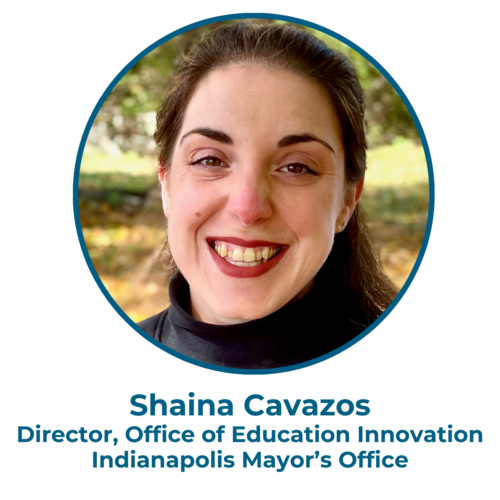 Shaina Cavazos
Shaina Cavazos
Director, Office of Education Innovation
Indianapolis Mayor’s Office
Personal Motivation and Journey
Did you find education or did education find you?
My parents were both high school English teachers who not-so-subtly encouraged me to explore teaching as well, so I don’t think I could have avoided education even if I’d tried. It only took 18 months of journalism school for me to find my way back to education. During my reporting semester at the Missouri School of Journalism, education was my first choice for a beat, and I reported on it for three more years until I graduated. By then, I was hooked, and—to my slight chagrin—I had to admit my parents were right.
What personal values or experiences do you draw from, when navigating challenges in your work?
I actually draw quite a bit from my Jewish upbringing. There’s a concept in Judaism called “Tikkun Olam,” which means to literally “repair the world.” I believe strongly that we have a responsibility to leave our world better than we found it. Jewish values also emphasize our responsibility as members of a society to focus on progress over perfection. Those ideas are all inextricably linked for me, and they’re very present in how I think about my career, from when I was reporting at Chalkbeat Indiana to my job now as an authorizer. I want to serve my community and my city—a place that has offered me incredible opportunities. I’m invested in making Indianapolis a better place for all students, and in making the charter schools we work with as strong as they can be. And while I can’t fix every problem, I can often at least make progress that leads to better results for kids—and that motivates me through the most challenging moments of authorizing.
Leadership
Tell us about a change you’ve been a part of.
Most of my time at the Office of Education Innovation has been spent making many behind-the-scenes changes, so it’s tough to pick one example. I have worked to improve and, in some cases, transform, our internal and external systems and processes so that we can spend more of our resources on developing our people, understanding our schools’ performance, and collaborating to solve problems. As unglamorous as that work may sound, it has enabled me to drive improvements in nearly every aspect of our work. I overhauled our compliance and document submission platform. I’ve managed numerous revisions to our performance framework, charter contract, and application and renewal processes. I’ve set new standards for how we interview—from the questions we ask to the ways we show we are listening. Big and small, I think change is a constant part of working in education. The best I can do is be open to that and use the opportunities to move us forward as an office.
How do you balance bold innovation with practical, actionable accountability?
Strong authorizing must be built on a bedrock of practical, actionable accountability. We have a responsibility to hold schools to high standards, enforce those standards, and act, if a school cannot adhere to them. The success of our students depends on it. Charter schools have been around for decades—we know what good schools look like. We know which resources matter, and which don’t. Innovation should be something all our schools aspire to, as a way to help find efficiencies or create opportunities that previously did not exist, but it should not come at the expense of holding the line on performance.
Future and Legacy
What change are you looking forward to, in education or your community?
As much of the pandemic-era COVID relief funding comes to an end, I’m looking forward to participating in and seeing the takeaways from those efforts: what worked, and what didn’t. To meet the needs of the moment, new programs were developed or grew (such as Indianapolis’ investment in Circle City Readers and City Connects) and we couldn’t know then how it would turn out. I’m buoyed by the data we’re seeing from our investments that show students accelerated their learning and had more access to community resources and services. I’m very interested in learning where else in the city—and across the country—educators and youth-serving organizations saw similarly strong results, and how we can find additional resources and efforts to continue that important work.
If you could give one piece of advice to authorizers, school leaders, or those in the charter school sector, what would it be?
I’d remind authorizers that strong authorizing matters, even on days when you feel removed from school life or when challenges pile up. I’ve seen what happens when authorizers, for too long, looked the other way. Every touch point, conversation, and relationship matters in this work, and our schools and communities are better for it.
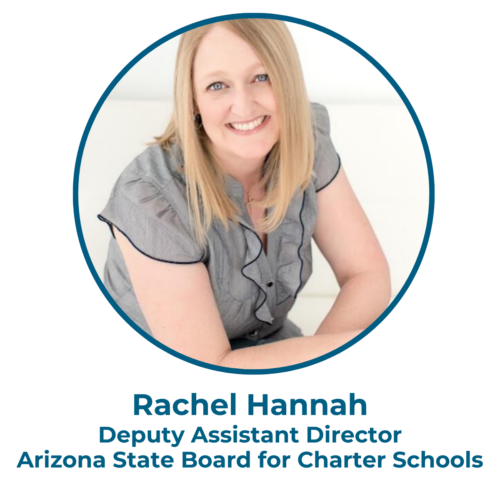 Rachel Hannah
Rachel Hannah
Deputy Assistant Director
Arizona State Board for Charter Schools
Personal Motivation and Journey
Did you find education or did education find you?
I think it was a little of both. After my grandmother raised her family, she went back to school to become a teacher. She loved learning and attended the university where my grandfather taught and her grown boys attended. As a kid, I spent a lot of time with my grandmother when she was a teacher. Many of my core memories revolve around being in her school building and doing fun learning activities with her. I don’t think she did it intentionally, but her influence stuck with me. Her enthusiasm for learning and teaching is what ultimately paved my way to the classroom as a teacher.
Although I excelled in school, my high school experiences showed me that the traditional public education system isn’t for everyone. I did not enjoy the traditional high school experience, and withdrew from school my senior year to finish using courses at the community college. This was my first exposure to school choice, but it wasn’t the norm at the time, and my family had to advocate for this option. It made me realize that education didn’t have to be the same for everyone. This idea led me to a charter school classroom, and ultimately, to authorizing.
What personal values or experiences do you draw from, when navigating challenges in your work?
My human-centered approach to my work and challenging situations I encounter has been shaped by my professional and personal experiences. I remember vividly that, when interviewing for my first teaching position in a public charter school, the principal told me that teaching was as much customer service as it was being an educator. I’m not sure I understood what that really meant when I was 21 and I just needed a teaching job. But, in that very first classroom, teaching first grade, I quickly learned that if I didn’t build relationships with my students, their families, and my colleagues, I wasn’t going to make it through that first year.
That was when I learned that being authentic and making connections was a key to moving the needle in education, and in reflection, I think that was what customer service looked like for me. My supervisors over the years each seemed to lead me further toward the understanding that taking the time to get to know the people you work with (and for) is often the key to navigating difficult situations and challenges. It is through this lens that you are able to practice perspective-taking and try to consider various viewpoints to navigate decisions or situations.
My parenting journey has also become a key factor in how I approach my work. I am raising a child for whom the traditional education system is not designed. Further, our experience has highlighted the fact that the system is not built for working families. Each of these experiences has encouraged me to approach challenges in my work by considering how a decision or action would have impacted that first classroom of mine, the many families I’ve served, my former colleagues, or my own child and others like them. When I consider these many connections, it centers me in making reasoned, authentic decisions I can stand behind.
Leadership
Tell us about a change you’ve been a part of.
In my time with the Arizona State Board for Charter Schools, as a leadership team, we’ve worked through a significant cultural shift, both internally and externally.
Internally, we’ve made noteworthy changes to our hiring and employee development practices. These changes ensure that our employees are aligned with our efforts to provide the highest level of customer service to all stakeholders, and to also do the hard and essential work of regulation and compliance. We have achieved this through meaningful interview processes, thoughtful training programs, and continuous conversation and level setting.
As an extension of our internal adjustments, we have restructured how we engage with our existing charter holders and new applicants. We’ve increased the expectations for our portfolio and our new charter applicants. At the same time, we’ve built relationship-based structures into all of our practices. This allows us to both assess and build capacity as we work through accountability processes and application cycles. One component of this has been the increased engagement and support opportunities for applicants, throughout our new charter application cycles, as we created time and space for applicants to give and receive feedback.
How do you balance bold innovation with practical, actionable accountability?
Accountability is one of my core values, and I tend to really love the black and white of the world. I think the key to balancing accountability and innovation is perspective. As much as I love rules and things in neat little boxes, I also believe that you have to look at things from every angle and stakeholder perspective. Sometimes my gut quickly jumps to all the reasons that the crazy, innovative thing isn’t possible, but the key is to push past that. You have to be willing to continue the conversation, wade through the uncomfortable, and consider the greater good. Once you’ve navigated that, you can make a reasoned decision, and methodically consider the implementation and how you can maintain practical accountability, while moving forward with positive change.
Future and Legacy
What change are you looking forward to, in education or your community?
I look forward to continuing to remove barriers for innovation and driving additional access for families. Every child deserves a school that is an amazing fit for their unique needs, while also improving overall outcomes. Although we’ve tried for years, we still aren’t there. Too many kids are still having to settle for a “good fit” when I think that we can strive for schools, programs, and opportunities that are an “incredible fit.”
If you could give one piece of advice to authorizers, school leaders, or those in the charter school sector, what would it be?
Lead with your heart and build strong, equitable, and implementable systems for accountability. Maybe that’s actually two pieces of advice, but in my view, you cannot have one without the other. It is imperative that we lead with our hearts, centering our work on the people involved. Although this is primarily students and families, it is also all the people serving those students and families, at every level. We must embrace the gray in our work, work through the hard conversations, and find ways to work hand in hand with stakeholders to achieve outcomes that are best for the students in our schools.
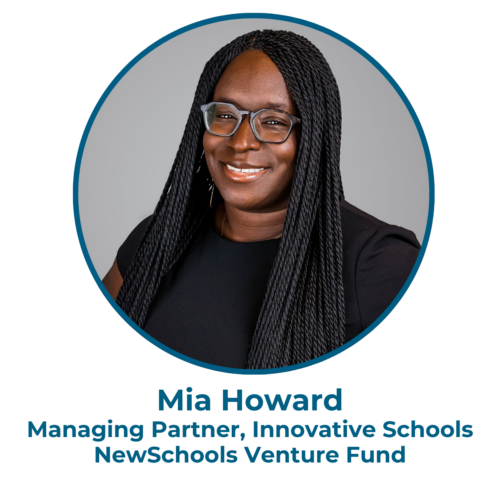 Mia Howard
Mia Howard
Managing Partner, Innovative Schools
NewSchools Venture Fund
Personal Motivation and Journey
Did you find education or did education find you?
It was a little bit of both. Both of my parents were teachers—elementary and middle school level, early in their careers. My aunt and uncle were also career educators in NYC Public Schools so I grew up in a family that placed a huge importance on learning and excelling in school, and in a home full of books! I also loved school. I spent summers at “nerd camp” and was part of a peer group that cared about learning, so postsecondary was the natural next step for me.
Fast forward to after undergrad: I started my career working on Wall Street. It was a huge learning curve but super interesting work. Then I got the bug to go to law school, which is actually where I discovered my passion for working in K-12 education. I taught Constitutional Law to 12th graders at a top magnet school in Philly and, during that time, I learned about education reform (in both policy and business contexts) while in school.
I took a risk and decided to go back to Nashville—-a community I care deeply about—and there, I created Intrepid College Prep, a middle and high school in a melting pot neighborhood on the Southeast side of Nashville.
What personal values or experiences do you draw from, when navigating challenges in your work?
My values include: adaptability, forgiveness, integrity, caring, optimism, and agency.
My faith, my parents who have served as role models to me, and the sponsorship and mentorship I have received from incredible women educators (Shantelle Wright and April Knox, to name just two of many), all help me navigate challenges. I have seen the power of paying it forward, and prioritizing mental health. I know this work is bigger than us and it’s a relay race where we must put in the work and then we must pass the baton.
Leadership
Tell us about a change you’ve been a part of.
I’m proud of co-creating a strong ecosystem for quality school choice in Nashville. This work has involved a great deal of cooperation. We’ve created networks for learning of shared and divergent practices which, in turn, equips, pushes, and inspires one another.
It has also been exciting to be part of seeding innovation and new models in St. Louis, where we are creating the space and conditions for new approaches to old problems.
How do you balance bold innovation with practical, actionable accountability?
I’d probably start with asking some important questions like, “What is the world you want to create, both from an outcomes perspective and what it will feel like, look like, be like, to thrive in it? How will we know whether we’ve been successful?” And from there, “What are the design principles and values that should shape the path to get there?” Let’s get agreement about that.
Then it’s the research—not just innovation for innovation’s sake. Where should we replicate or scale existing practices that are already working well? What haven’t we figured out yet? That is where innovation is needed.
Next, we have not yet figured out—at scale—how to create and sustain learning environments that work for ALL students, and where educators also are receiving the support and development they need to thrive as learning facilitators. We have done great work as a field to expand the definition of student success—countering the false binary of academics AND habits/mindsets/skills. They are mutually reinforcing.
Future and Legacy
What change are you looking forward to, in education or your community?
I’m looking forward to three things:
- Reimagining the roles of educators
- Shifts that make school systems accountable to families
- Schools as community infrastructures
If you could give one piece of advice to authorizers, school leaders, or those in the charter school sector, what would it be?
Can I share three? Build broader coalitions, get outside of your context for learning, and follow the data.
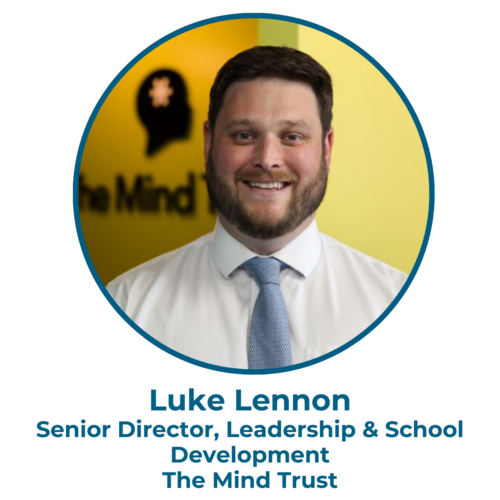 Luke Lennon
Luke Lennon
Senior Director, Leadership and School Development
The Mind Trust
Personal Motivation and Journey
Did you find education or did education find you?
Education found me. I was trying to decide what to take for my second Theology credit, which I needed to graduate. A professor told me I could earn the credits through service, so I spent a summer teaching middle school in Buffalo, NY. l taught every subject. I’m sure I was terrible at it, but it was so energizing, and I loved the students. I came back to campus, heard about Teach For America (TFA) from a professor, and then was placed here in Indianapolis at an all-boys school.
What personal values or experiences do you draw from, when navigating challenges in your work?
Of course, when things are challenging, I try to remind myself of our students. If a school is working really hard to provide a world class education, then they are pushing students hard daily. They’re giving feedback, asking students to stretch themselves, and asking students to do things they may be uncomfortable with. There are kids all across our city and our country who work harder than I know I did in middle school and high school—kids who might be reading or doing math below grade level but still put in their all. Certainly, if they can live in whatever discomfort or challenge that might be, we can handle whatever comes our way.
Leadership
Tell us about a change you’ve been a part of.
Honestly, the first thing that comes to mind is fatherhood, but I don’t know if we want to go down that road—ha!
I’d say another big change I’ve been a part of is the shift in the charter landscape here in Indianapolis from 2012 to 2024. While charters were certainly not new to Indy in 2012, it was still a relatively nascent landscape. Now, in 2024, we have over 50 charters in the city, so change in volume has been one thing. That’s come with opportunities and challenges. We have so many options for parents, and schools are able to fill different niches as we grow. This is a great thing, and really gets at the “system of schools” and not the “school system” idea I know many of us trumpet in this work.
How do you balance bold innovation with practical, actionable accountability?
Some of this is about our appetite for risk. And to that I say, what’s the worst that can happen? We try a new idea and only a handful of students are proficient? That’s our reality now, and we seem to have the stomach for it, though we shouldn’t.
Risk taking should, in general, be rewarded and sought constantly in our sector. But when we do invest in big ideas, we can make those bets smaller. A leader can have a unique and niche idea, something that no one else is offering. Maybe we—organizations like The Mind Trust and authorizers like Indy’s Office of Education Innovation—may say, “Hey, this is wonderful and new.” But because it’s new, does it make sense for us to try this as a program in an existing school first? Or maybe even a microschool charter within your current model? And then, from there, we iterate and scale.
Finally, while we talk about innovation, often, what we’re really doing is dabbling at the margins. We tweak a school model or slightly shift an organizational chart. Charter schools, in principle, and at their outset, were an innovative shift to the full system. How can we be thinking more in that spirit? One example is how we could shift all of K-12 to better educate our young men. A researcher, Richard Reeves, wrote a tremendous book titled Of Boys and Men. In it, he talks about how there are two moments in a boy’s life where girls outpace boys in executive functioning—at 5 years old and at 14 years old. This is especially tough, because these are two pivotal moments in a child’s K-12 education. Reeves, with a spate of research behind him, makes the case that we should redshirt boys and possibly either extend high school by a year or give boys a gap year. Now, you might think that idea is imprudent, and that’s okay. Listen to the principle and not the specifics. If we shifted our entire K-12 system so high school was 5 years or boys didn’t have to enter Kindergarten until age 6, that would be a systemic shift, and, I would argue, real innovation.
Future and Legacy
What change are you looking forward to, in education or your community?
I know the day is coming when we’ll get funding parity for our schools. Currently, Indianapolis charter schools have a $7,000 funding gap compared to district schools. Our schools are showing they can do more with less, and that’s great. But imagine how much more they could do with more. I also look forward to a world where we provide the arts and sports to our decentralized system of schools.
If you could give one piece of advice to authorizers, school leaders, or those in the charter school sector, what would it be?
Well, first, in this season of gratitude, I would say thank you. We—nonprofits, authorizers, those in the larger sector—should never forget that we exist to lift up schools and school leaders. My advice would be to keep the main thing the main thing. Schools can do so many things for children, but their most pressing goal is to impart as much knowledge as possible so that students have the best chance at life after K-12. Any program, project, innovation, or hire you have or make should be in service of this goal.
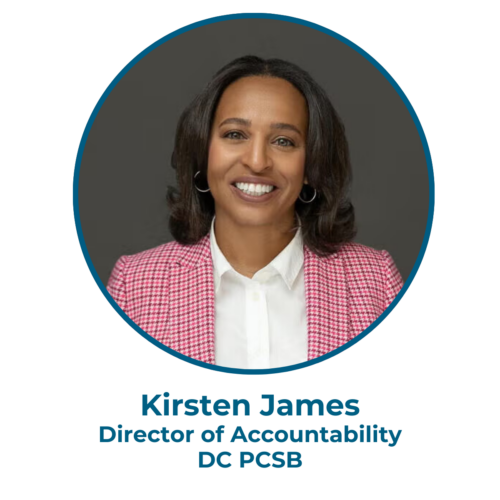 Kirsten James
Kirsten James
Director of Accountability
DC Public Charter School Board
Personal Motivation and Journey
Did you find education, or did education find you?
I’d say I found teaching, but that was limited to classroom teaching; education beyond the classroom found me. I studied education in college, but it was just one of my minors, and after I graduated, I went right into a teaching and alternative certification master’s program. Still, it was just about the classroom. Very early on, I knew I hated planning, and I loved data.
Education data, and all the ways it lives in the field, found me. Every role I’ve had since leaving the classroom has given me new opportunities to serve students in ways I didn’t previously know existed.
What personal values or experiences do you draw from, when navigating challenges in your work?
The personal values I draw from when navigating challenges in my work are:
Commitment to Growth: Challenges are opportunities for growth—for myself, my team, and the broader organization. This mindset helps me approach obstacles constructively.
Collaboration: Anyone in education who says they’ve done something by themselves is lying. Multiple perspectives enrich problem solving. Hearing from those closest to the work (e.g., school leaders or students) strengthens both the process and the product. I am also a strong supporter of non-educators bringing their expertise to education; there’s so much we can learn from other industries.
Transparency: Some may say I’m too honest sometimes, but I know that honesty and vulnerability are critical to building trust. Sharing challenges candidly and explaining the rationale behind decisions helps maintain credibility, especially in difficult situations.
All my work experiences—back to my classroom teaching days, have given me tools that help me navigate challenges in my work now. Teaching in a high-need urban setting taught me resilience and adaptability. Training educators developed my ability to communicate clearly, inspire confidence, and navigate resistance to change. My work with New York City’s Department of Education helped me recognize that so many challenges in education are not specific to one school system, and a school system’s size does not correlate to the size of its challenges.
Supporting school leaders in DC Public Schools with data emphasized the importance of balancing evidence-based decisions and being mindful of the human side of education. Launching ASPIRE (the DC Public School Charter Board [DC PCSB] revised academic accountability system) reinforced the need to stay grounded in our organization’s mission and the project’s guiding principles, even when navigating stakeholders’ competing priorities.
Leadership
Tell us about a change you’ve been a part of.
I lead the development of ASPIRE. It primarily serves as a tool for DC PCSB to make school oversight decisions and a mechanism to communicate school performance to communities.
In 2021, when I joined the team, we committed to revising our performance measures to evaluate student group performance; prioritize academic growth; further differentiate measures of school quality by framework; and expand, refine, or introduce new measures.
Each year, DC PCSB will use the ASPIRE System to evaluate every DC public charter school campus. DC PCSB will use ASPIRE results to inform oversight and authorizing decisions, awarding high-performing schools eligibility to replicate or expand their programs and closely monitoring low-performing schools.
A huge learning was that this project was not just about accountability. It became DC PCSB’s opportunity to demonstrate our commitment to race, equity, diversity, and inclusion (REDI) and to communicate that academic evaluation is only one of many tools we use in our charter school oversight. As such, ASPIRE evolved from a School Quality and Accountability team project to a DC PCSB organization-wide project.
How do you balance bold innovation with practical, actionable accountability?
This balancing act requires a thoughtful approach that aligns creativity with real-world feasibility. It means being bold in vision but strategic in execution to ensure sustainability of the impact.
Again, ASPIRE has been an opportunity to anchor innovation in DC PCSB’s mission and the project’s guiding principles. The ASPIRE System has introduced School-Specific Performance Measures, where schools collaborate with DC PCSB to identify at least two measures that assess aspects of the school program that may not be captured elsewhere in the accountability framework—qualities that are important to a school’s mission, program, or model. Including these measures in a school’s scored ASPIRE performance will give DC PCSB staff and the larger community new information about schools.
Future and Legacy
What change are you looking forward to, in education or your community?
I’m particularly looking forward to changes that center on equity in education, which have the potential to redefine how we support students and schools in a meaningful way.
While whole-child approaches to education aren’t a new concept, I think COVID recovery is giving us a new opportunity to think about the importance of student wellness—mental, physical, and emotional. I’m looking forward to a shift toward valuing social-emotional learning, mental health support, and extracurricular enrichment as much as academic outcomes, and finding the most effective ways to capture these efforts and measure the impact of schools on these non-academic outcomes.
I look forward to seeing more diverse voices represented in school and district leadership and in education policy making.
If you could give one piece of advice to authorizers, school leaders, or those in the charter school sector, what would it be?
It’s all about the students. Keep that front of mind, put it on a post-it on your computer, whatever you need to do. It’s all about the students.
Learn more about our 2024 Change Makers’ stories, explore their visions for the future, and hear how they’re paving the way for a brighter educational landscape.


